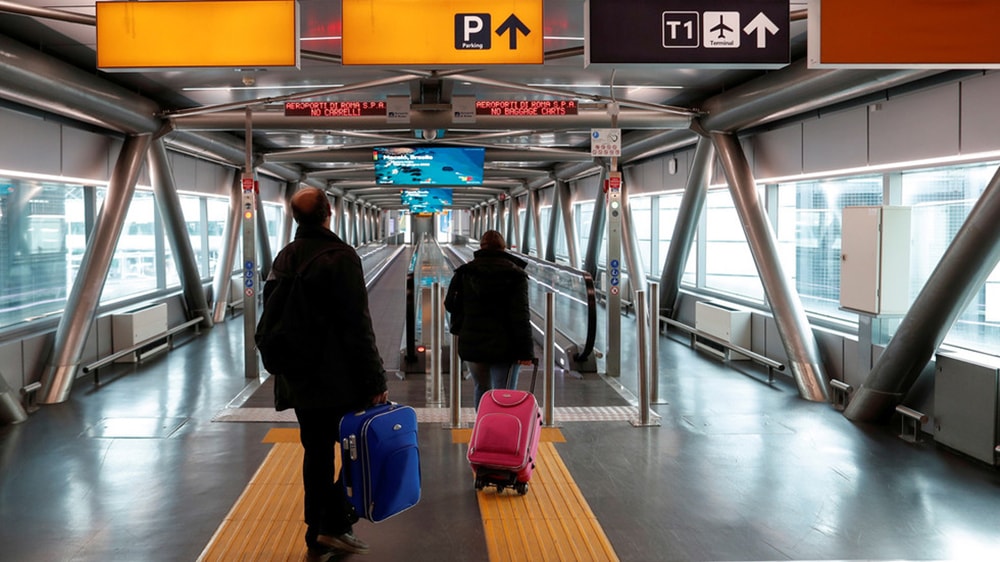EU eases lockdown, 'headache' calculating reopening of borders
(Baonghean) - Starting today (May 11), many countries in Europe such as France, the UK, Spain... have begun to ease the lockdown after a period of time when the number of Covid-19 infections has decreased day by day. However, the European Commission last weekend still asked countries in the European Union (EU) to maintain border closures with the outside until at least June 15, 2020, because opening the border is really a "big gamble" for Europe, although many countries consider this an important step to bring the economy back to normal.
“Deserted summer” in Europe
Every year at this time, European countries prepare to enter the busiest tourist season of the year, welcoming nearly half of the world's international tourists with about 360 million arrivals, bringing in revenue of about 150 billion Euros from June to August.
But this year, Europe is experiencing an “unusual” summer, with famous tourist destinations becoming deserted, from the central square of the Grand Palace in Brussels, to the Colosseum in Rome, and the city of Venice without the sight of gondolas going back and forth…
 |
| Schengen countries are considering opening their borders to revive their economies. Photo: Getty |
Covid-19 is pushing the European tourism industry into an unprecedented crisis, while this is a key economic sector in many member states of the European Union. Currently, tourism contributes up to 10% of Europe's GDP. In some countries such as Greece and Malta, the proportion of the tourism industry in GDP is up to 20-25%. For Spain and Italy, the two largest Covid-19 epidemic centers in Europe, the contribution of the tourism industry to the economy is also at 14% and 13%, respectively.
The strict lockdown measures that European countries are implementing to prevent the spread of Covid-19 have affected many economic sectors, but tourism is among the most heavily affected. According to calculations by the European Tourism Council, travel businesses in the EU will lose about 70% of their revenue, airlines will lose up to 90%, and it is estimated that the entire European tourism industry could lose up to 400 billion euros this year. In the plan to establish a rescue fund of more than 1,000 billion euros in Europe - also known as the "Marshall Plan", experts calculate that the tourism industry needs to be allocated up to 20%.
Therefore, when starting to implement measures to ease the blockade and restore economic activities, many European countries are aiming for the common goal of restoring the tourism industry. Some countries have proposed individual measures such as Greece considering allowing tourists to enter the country with a "Health Passport", which includes confirmation that tourists are not infected with the SARS-CoV-2 virus, Austria considering accepting tourists from countries in the Schengen area with low Covid-19 infection rates, or Belgium considering providing cards allowing tourists to visit some beaches...
 |
| A German man buys French bread at a border checkpoint between the two countries. Photo: Washington Post |
However, up to this point, no European country has determined when to reopen its borders, while any tourism stimulus measures are unlikely to be effective if countries remain "closed" to prevent the spread of the Covid-19 epidemic.
Gari Cappelli, Croatia's Minister of Tourism, who chaired the recent EU Council meeting, said that Europe needs a common plan to rebuild the tourism industry - one that can both boost tourism growth and manage risks across the Union. This plan could be set up in stages, starting with countries lifting domestic travel restrictions, then opening borders within the EU, and then considering opening borders to countries outside the bloc.
The problem of "gain - loss"
In addition to tourism, reopening borders is also important for reviving many other economic activities in Europe, given that the use of seasonal workers from other countries in the European Union is quite common among businesses. Many argue that closing borders cannot be a long-term measure, so Europe needs to have a plan for reopening borders as part of a common master plan.
First of all, the opening of borders could apply to seasonal workers. Some MEPs argue that, while it is necessary to control health risks, it is time for Europe to return to the rules of the Schengen free movement area, in particular the principle of non-discrimination between workers in different countries.
 |
| People and tourists wear masks to prevent Covid-19 infection in Paris, France. Photo: VNA |
European Commission President Ursula von der Leyen also affirmed that although the Covid-19 epidemic situation in member countries is still very different, there needs to be a unified approach in lifting the restrictive measures being applied across the European Union. Therefore, in order to move towards opening the borders, the European Commission has built a common set of principles for member countries in the process of easing the blockade, bringing economic and social activities back to normal. In particular, the abolition of border control measures will be applied at points determined to meet all epidemiological requirements.
Currently, some countries in the Schengen area have lifted travel restrictions on workers from other countries, for example, Germany allows 80,000 foreign seasonal workers to enter the country to work and applies strict health control measures for this group.
Although travel restrictions on cross-border workers may be eased, European leaders remain cautious about opening their borders to tourists, even though tourism is a key economic sector in many European countries.
Over the weekend, the European Commission still made an official recommendation to its members, which is to continue maintaining border closure measures until at least June 15, 2020. Many countries in Europe have unilaterally introduced tougher measures than the European Commission's recommendations. France was the first country in Schengen to announce that it would continue to apply border controls until the end of October this year. Sweden and Denmark also announced an extension of border controls until November. For countries that have not considered opening their borders, the most important reason given is to prevent a new wave of Covid-19 infections.
 |
| Many European countries still apply restrictions on foreign tourists. Photo: RT |
Preventing a new wave of infections when easing the lockdown is also a warning that the World Health Organization (WHO) has repeatedly issued recently. A new wave of infections is a real risk if we look at what is happening in South Korea and China - countries that are considered to have controlled the epidemic well and are starting to loosen restrictions, bringing economic and social activities back to a new normal state.
Yesterday, South Korea reported 34 new cases - the highest number after a month of continuous decline in new cases. Meanwhile, China also received 14 new cases, the highest number since April 28. Therefore, although from an economic perspective, Europe is calculating to open its borders, this is really a "big gamble", a "gamble" in which winning or losing is not only calculated in money, but also in human lives.




.jpg)
![[Infographics] 5 biện pháp phòng, chống dịch COVID-19 [Infographics] 5 biện pháp phòng, chống dịch COVID-19](https://bna.1cdn.vn/thumbs/540x360/2025/05/22/anh-2.jpg)

-5b8619d675cc4f38cedd8c853332ddab.jpg)
